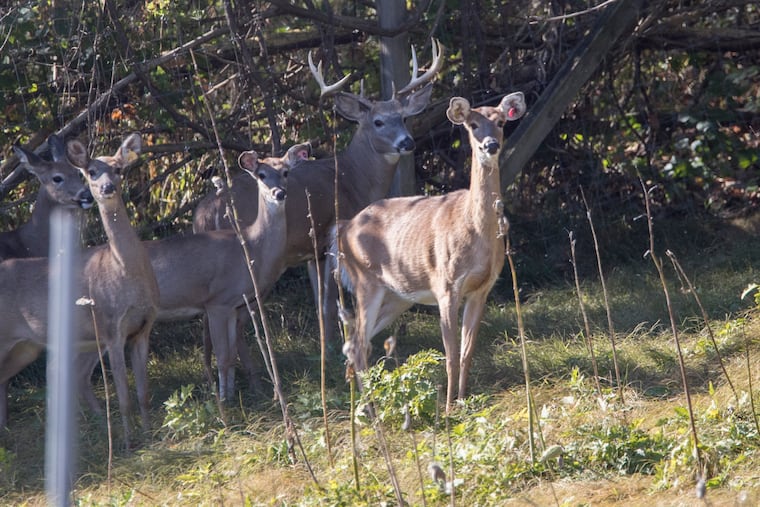Chester County man faces three months in jail for using a drone to recover a hunter’s deer
Laws on using drones to recover dead or injured deer vary from state to state, but hunting advocates say it's time to update regulations.

Deer hunting doesn’t always end after an animal is shot.
Sometimes an arrow or bullet isn’t immediately fatal and a deer can run, wounded, leaving a trail of blood on branches and dead leaves. Hunters can follow that blood if conditions are ideal, or they can hire a tracking dog to follow the scent and, ideally, recover the deer.
Now, hunters nationwide are soliciting the use of drone operators, to help recover deer — but the laws regarding that relatively new technology vary from state to state. In Pennsylvania, it’s illegal to use most electronic devices as aids in hunting, including walkie talkies and even cell phones. A Chester County thermal drone operator who tried to recover a deer for a client was charged in a Pennsylvania Game Commission sting operation in Lancaster County last month.
Drone advocates say deer recovery is another viable way for operators to make money and believe the issue and potential consequences need to be ironed out sooner rather than later.
“It’s common sense to me and I don’t think we should try to overthink it,” said State Sen. Jarrett Coleman, a Republican who represents Lehigh and parts of Bucks County. “Is there any good reason to allow an animal that’s been killed to go to waste?”
Looking to Ohio
Citing the Lancaster County case, Coleman released a memorandum on Jan. 2 seeking cosponsorship of a bill to allow the use of drones for recovering downed game.
“The state of Ohio permits the use of drones in the recovery of downed game,” Coleman wrote. “Unfortunately, the Pennsylvania Game Commission appears to be taking a hostile view of the use of drones in game recovery.”
On Dec. 6, the game commissions issued four citations against Downingtown resident Joshua Wingenroth during an undercover operation at the Welsh Mountain Nature Preserve in Lancaster County. Wingenroth, who owns Wingy Drone Services, was charged with two counts of unlawful devices and methods and one count each of disturbance of game and wildlife and restrictions on recreational spotlighting. Both Wingenroth and his attorney declined to comment when reached by the Inquirer.
The game commission seized Wingenroth’s drone, which is valued at $10,000. His combined charges carry a maximum of $2,500 in fines and up to three months in jail.
Travis Lau, a spokesman for the Pennsylvania Game Commission, said drones fall under a broad, general prohibition on the use of electronic devices in hunting.
Lau said Wingenroth’s case was the first time a drone operator has been charged in the state. The game commission uses drones itself, Lau said, for “wildlife surveys and photography.”
Mike Yoder, owner of Drone Deer Recovery in Ohio, helped train Wingenroth and operates a popular YouTube channel with 93,000 subscribers. He discussed Wingenroth’s case in a recent video.
“To intentionally set a guy up to take his equipment: that doesn’t sound like conservation to me,” Yoder said in the video.
‘States are all over the map on this issue’
Donna Matias, an attorney at Pacific Legal Foundation, represented Yoder in a lawsuit challenging Michigan’s Department of Natural Resources’ ban on the use of drones to locate downed game. Matias said many states have taken a blanket, ban-it-all approach to drones and hunting.
“The states are all over the map on this issue,” she said. “Deer recovery is a no brainer, though, and once people get past the idea that we’re not getting drones with guns attached to them shoot deer, it’s a very straight forward case.”
Change happens slowly in the hunting world — blood tracking dogs weren’t legalized in Pennsylvania until 2018 — and, often, those changes spark even more controversy among old-school hunters.
Tracker Andy Bensing said it took 16 years to pass legislation on dogs, because older generations feared the dogs would be used to actually hunt the deer and violate the age-old ethos of “fair chase.”
“There was a time when dogs were used to hunt deer and they nearly wiped them out,” he said.
Bensing said the state needs to clearly define that drones, like his Bavarian mountain hounds, can’t be used to hunt or scout.
David Heath, director of the Pennsylvania Drone Association, said he’s working with Coleman’s office to help come up with reasonable guidelines. Heath said there’s approximately 3,700 commercial drone pilots in the state but it’s unclear how many are working in deer recovery. Yoder’s website lists five operators in the state.
Heath said Wingenroth appeared to have done everything correctly, including making his client sign a waiver stipulating that if the deer was found alive, the client would wait 24 hours before continuing to hunt the deer. That’s the law in Virginia, a state many say has the best approach to recovery drones.
“I’m not trying to shove drones down people’s throats,” he said. “We’re trying to be fair to wildlife.”
Mike Kriner, director of government affairs for Pennsylvania Federation of Sportsmen and Conservationists, said approximately 70% of the organization’s membership was opposed to using drones in deer recovery several years ago. He believes that number would be much less today.
“I think people feared it could be a slippery slope,” Kriner said. “There’s a lot of issues at play with deer recovery, including trespassing and property rights, the whole principle of fair chase. It’s an issued that needs to be ironed out with all parties. I think we need to take baby steps.”